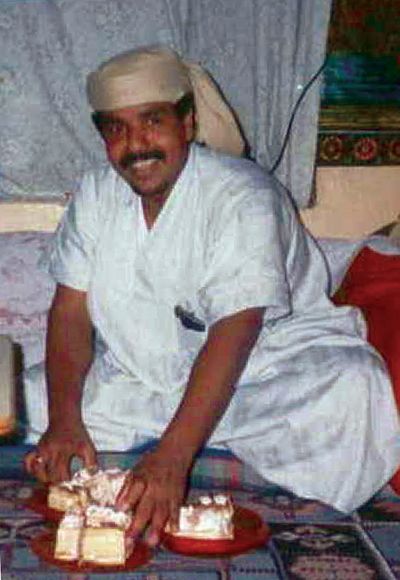Jury convicts bin Laden’s ex-driver
Mixed verdict still a victory for Bush administration

GUANTANAMO BAY, Cuba – A military jury on Wednesday found a former driver for Osama bin Laden guilty of supporting terrorism but not of conspiring in terrorist attacks, handing the Bush administration a partial victory in the first U.S. war crimes trial in more than half a century.
The verdict, reached after about eight hours of deliberations over three days, only intensified the debate over whether Salim Ahmed Hamdan’s conviction was preordained in an unfair system – or whether military trials are appropriate for people accused of committing heinous acts against the United States.
The administration seized on the acquittal to defend its military justice system against accusations that it was politicized and drawn up to ensure convictions. Pentagon and White House officials said they are satisfied with the result.
“We’re pleased that Salim Hamdan received a fair trial,” White House spokesman Tony Fratto said. “The military commission system is a fair and appropriate legal process for prosecuting detainees.”
Despite the partial acquittal, Hamdan still faces up to life in prison. Jurors will reconvene today to determine his sentence.
With the conclusion of the trial – the first by military commission since the end of World War II – U.S. prosecutors can move ahead with military trials for up to 80 Guantanamo Bay detainees, including those accused of planning the attacks on the World Trade Center and the Pentagon. One reason Hamdan, who even the military judge labeled “a small player,” was tried first is so the system could be tested on him.
The six-member military jury found Hamdan guilty of supporting al-Qaida by driving and guarding bin Laden and ferrying weapons for the terrorist group. The jury found him not guilty of conspiring in terrorist attacks.
Hamdan, a Yemeni father of two, bowed his head and wiped his eyes with his white headdress as the verdict was read.
The judge, Navy Capt. Keith Allred, called it “an emotional moment for Mr. Hamdan,” who was later led back to his cell at the U.S. detention facility here, his home for the past six years.
President Bush first empowered the commissions after the attacks of Sept. 11, 2001, reversing a tradition of trying alleged terrorists in civilian courts in an effort to seek swift and tough-minded military justice. The process had experienced legal, procedural and diplomatic delays.
Deputy defense counsel Michael Berrigan called the trial a “travesty” but said the defense team “is not at all unhappy with the results.”
Ben Wizner, a lawyer with the American Civil Liberties Union who attended the trial as one of several human rights observers, ridiculed the administration for inaugurating the military system on “a marginal figure.”
Even the prosecution’s own evidence portrayed Hamdan as someone who ferried weapons for al-Qaida and knew details of terrorist attacks, but only after they occurred and often based on conversations he overheard. One FBI agent testified that Hamdan emerged from training at an al-Qaida camp and said he had no interest in fighting.
“We were told that Guantanamo was necessary because these were the world’s most dangerous terrorists,” said Wizner, who criticized the Pentagon for revealing little about U.S. interrogation techniques. “Salim Hamdan is not one of the world’s most dangerous terrorists.”
Col. Lawrence Morris, the military commissions’ chief prosecutor, countered that the two-week trial was “extraordinarily fair, open and just” and that Hamdan is “a career al-Qaida warrior, pledged to ensuring the personal security of Osama bin Laden.”
Hamdan was convicted of material support of terrorism but acquitted of conspiracy. A two-thirds vote – four of the six jurors – was required for conviction, but the exact vote was not released. Prosecutors declined a request to interview panel members.
The broadly worded material-support charge was easier for prosecutors because it required them to prove only that Hamdan knew al-Qaida was a terrorist group yet helped it anyway. Conspiracy was more difficult because it required proof that Hamdan agreed to support terrorist acts – a specific intent.